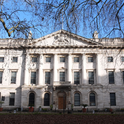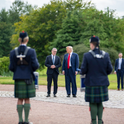Everything about this week’s UK-EU deal was overhyped on both sides. For all the government bluster, it wasn’t a substantive reset. It makes practically no difference to the Tory Brexit deal. As for the Brexiters, claims of “betrayal” and “surrender” are surreal, when matched against both the content of the deal and the betrayal of their own claims about the benefits of Brexit, virtually none of which have been realised.
Let’s start with the non-reset. The big mistake is to see a “new dawn” in pictures of Keir Starmer in deep conflab with Friedrich Merz, Emmanuel Macron and Ursula von der Leyen.
These deep conflabs are almost entirely about defence and security, mainly Ukraine and the Russian military threat to Europe. None of which was impacted by Brexit because Britain never left Nato and never abandoned defence cooperation with Europe and the US. On the contrary, Boris Johnson was the self-appointed leader of the Nato resistance to Putin’s invasion of Ukraine in 2022, and British policy hasn’t changed since. Brexit was a rejection of Jean Monnet (a founding father of the EU who espoused European economic, industrial and social integration) not Winston Churchill (who stood for British leadership of European military defence).
The most recent change to defence and security was the re-election of Trump and his progressive withdrawal from Nato. This American “reset” is forcing a “Europe first” approach to defence planning and military procurement which Brexit Britain has no choice but to support, unless we abandon Churchill as well as Monnet and become isolationist in the face of security threats to our own continent.
However, greater European cooperation on defence planning and procurement is not a change to the Johnson hard Brexit deal of forcing Britain outside the EU customs union and single market for the generality of our economic, industrial and social activity. In respect of this fundamental Brexit breach, this week’s Euro deal makes just only one notable reform in respect of just one industrial sector—namely, the end of veterinary and health checks on UK-EU trade in fresh food and agricultural produce, in return for British acceptance of EU standards for such trade. All other post-Brexit customs regulations and declarations will apply.
To put this in perspective, the amount of trade unleashed by this change is estimated at less than 0.2 per cent of GDP, a tiny fraction of the 4 per cent of GDP lost through the UK’s departure from the EU.
All the other items in this week’s deal are about matters largely unrelated to the customs union and the single market. Youth mobility schemes, the use of e-gates at airports, sharing of security information—none of these, or any of the other features of this week’s deal apart from the food and agriculture deal, reverse the key feature of the Brexit treaty, which was to make Great Britain (but not Northern Ireland) a “third nation” in respect of the EU regimes and institutions.
The real question is whether there might indeed be a reset in the years ahead, and if so how it might happen. What this week’s events indicate is that it is unlikely to happen by means of small steps. On the contrary, this week’s small step—with its ferocious “betrayal” backlash from the pro-Brexit right wing media and political parties—would have to be replicated dozens of times to get Britain within shouting distance of reversing Brexit. And neither this government, nor any conceivable future one, nor the EU itself, are going to be in the market for a new “reset” agreement or two every year in order to reverse the generality of the trade and regulatory barriers imposed by Brexit.
If Brexit is reversed, it will almost certainly come in one leap, the result of a political force that puts rejoining the EU firmly on the agenda. A force that is capable of turning the tables on the “betrayal” and “surrender” merchants to argue that it was the Brexiters who betrayed Britain, by surrendering to populists who were completely indifferent to the social and economic cost of excluding the UK from most of the institutions of its own continent.













